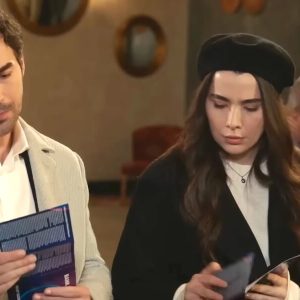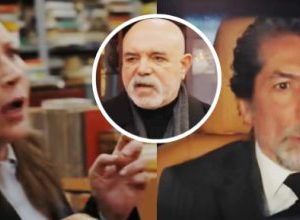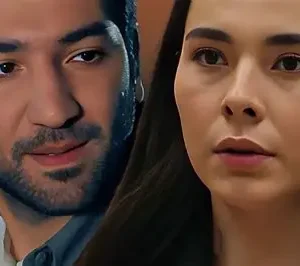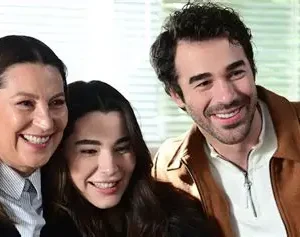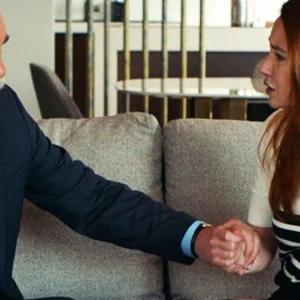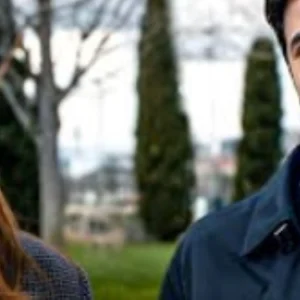The silence that cloaks the Dicleli villa is heavier than any scream, for within it lies the echo of a past dismantled and a future too uncertain to name. Karaman, returned from Avanos with the blood of another man pulsing in his veins, no longer fits into the ornate world built upon the Dicleli name. As he confesses the truth of his paternity to Oilum—his voice quaking, his soul stripped—his world begins to fracture. Oilum, steady yet shocked, is the first to truly understand what this means: the man she loves is not the heir of Tahir, but the illegitimate son of Sezai. Her eyes flicker with questions—what does this mean for their child, for their future, for the man she thought she knew? Just as the gravity begins to settle, Mualla arrives, worried, instinctively sensing the emotional earthquake that has just struck. But when Karaman hands her the DNA test, its black-and-white verdict slicing clean through decades of assumed motherhood, time seems to halt. The truth is now inked on paper: the boy she raised, the man she called son, never belonged to her in the way she believed. Her hands tremble, and in her chest blooms the hollow anguish of a love disowned by biology, betrayed by fate.
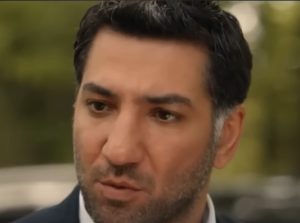
In a desperate act of dignity, Karaman places his keys and inheritance documents on the table—returning everything he’s been given by the Dicleli name. With Oilum and little Jan at his side, he announces their departure, not as a declaration of anger but a surrender to truth. Mualla’s cries are guttural, her knees giving way as if her bones cannot hold the weight of such a loss. She begs him to stay, reminds him that blood alone does not make a family. But he, composed yet resolute, tells her gently that this is goodbye. He calls her “aunt,” not “mother,” delivering the final cut. When they leave, the door doesn’t just close—it seals away three decades of motherhood, illusions, and unspoken love. Alone and shattered, Mualla collapses onto the cold marble floor, gasping in silent sobs, unable to breathe under the burden of abandonment. The house that once echoed with Karaman’s laughter now swallows her whole. Meanwhile, the villa of Guzide becomes an unexpected refuge. Karaman and Oilum arrive with Jan, unsure of their welcome, uncertain if warmth remains in a family torn apart by years of betrayal. But Guzide, ever the stoic matriarch, opens her home and her heart. Around the breakfast table, the tension eases, replaced with careful smiles and cautious acceptance. It’s not yet healing, but it’s a beginning.
Yet peace remains elusive elsewhere. In the shadows of their own crumbling union, Tarik and Yessim finalize a divorce that feels more like a battlefield surrender. Cold, transactional, void of tenderness, their meeting in the lawyer’s office is punctuated by Tarik’s final blow—a warning that if Yessim brings any man near their daughter, he’ll seize custody. His cruelty isn’t about the child; it’s punishment disguised as parenthood. Yessim, stunned and hollow, walks out defeated, her pride gone, her future fogged. She returns to Guzide’s villa seeking forgiveness, her eyes wet with the shame of past decisions. Her confession about her affair with Dundar stuns the family into silence. Guzide stares through her as though she were already a ghost, offering no words—just the frigid weight of disappointment. When Yessim turns to leave, her dignity crumpled, Umit unexpectedly follows her. In a small café, two broken souls talk. Umit admits to exposing her to Tarik, and Yessim, now with nothing left—no husband, no lover, no security—offers to dissolve the catering business they share. But Umit refuses. The business is all they have left that’s pure, built by their own hands. His plea is heartfelt: don’t burn the last bridge. She agrees, if only because she no longer has the strength to argue. When Dundar calls her, she silences the phone. Some mistakes, even love cannot excuse.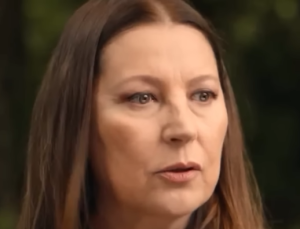
While one house begins to rebuild, another burns with resentment and secrets. Mualla, locked in her room, recounts to Nazan the entire twisted truth of Karaman’s origins. She speaks not just as a mother in pain, but as a woman betrayed by the silence of others—by Cadrie, by fate, by a past too heavy to hold. Nazan is stunned, her mind reeling from the web of deception. She asks how Karaman took the news, and Mualla, barely holding herself together, confesses that he’s gone. Not just physically—but gone from her heart, from her life, from the world she built for him. She sobs uncontrollably, crying out for him as though her grief could reverse time. And in another part of the city, Sezai too drowns in regret. He confronts Cadrie again, blaming her for robbing him of fatherhood. She insists she never knew, that she only tried to protect her daughter. But for Sezai, the damage is already done. He’s lost a son he never knew he had, and Karaman has lost the man who could have been his father. The tragedy is circular, relentless, unforgiving. In every corner of this drama, hearts are breaking under the weight of truths revealed too late.
